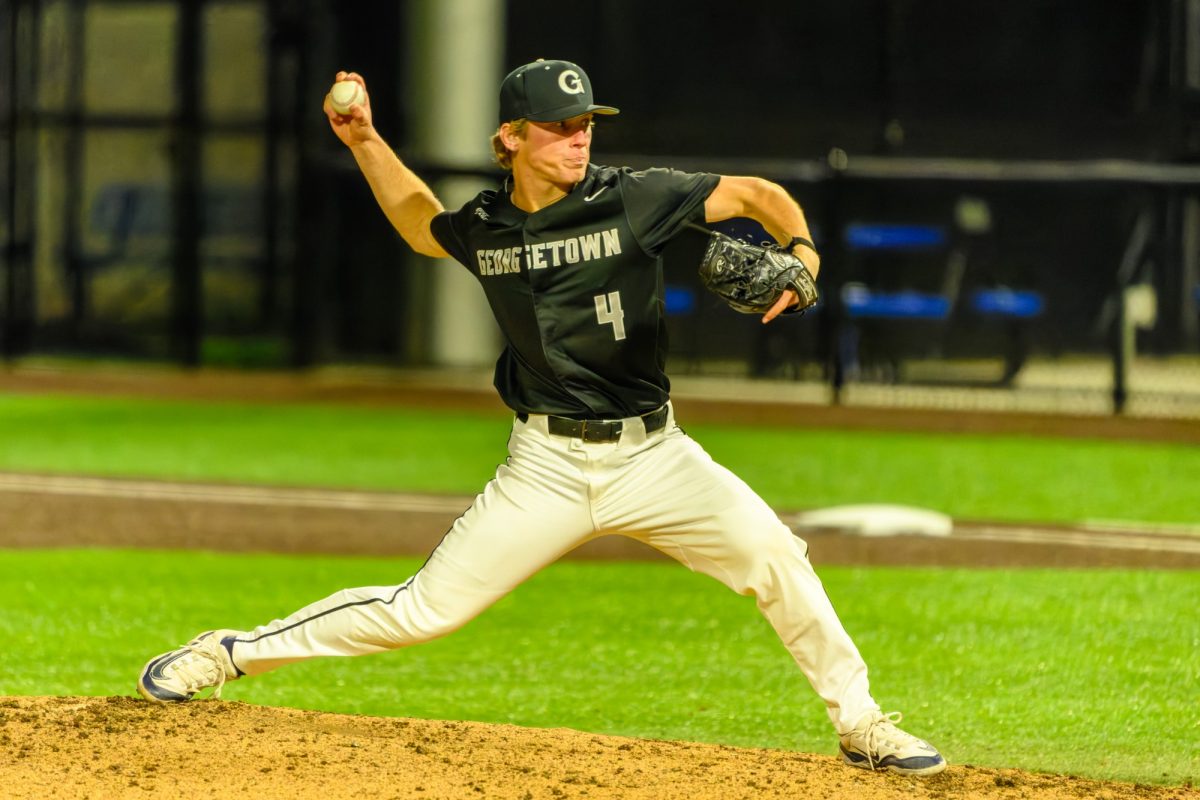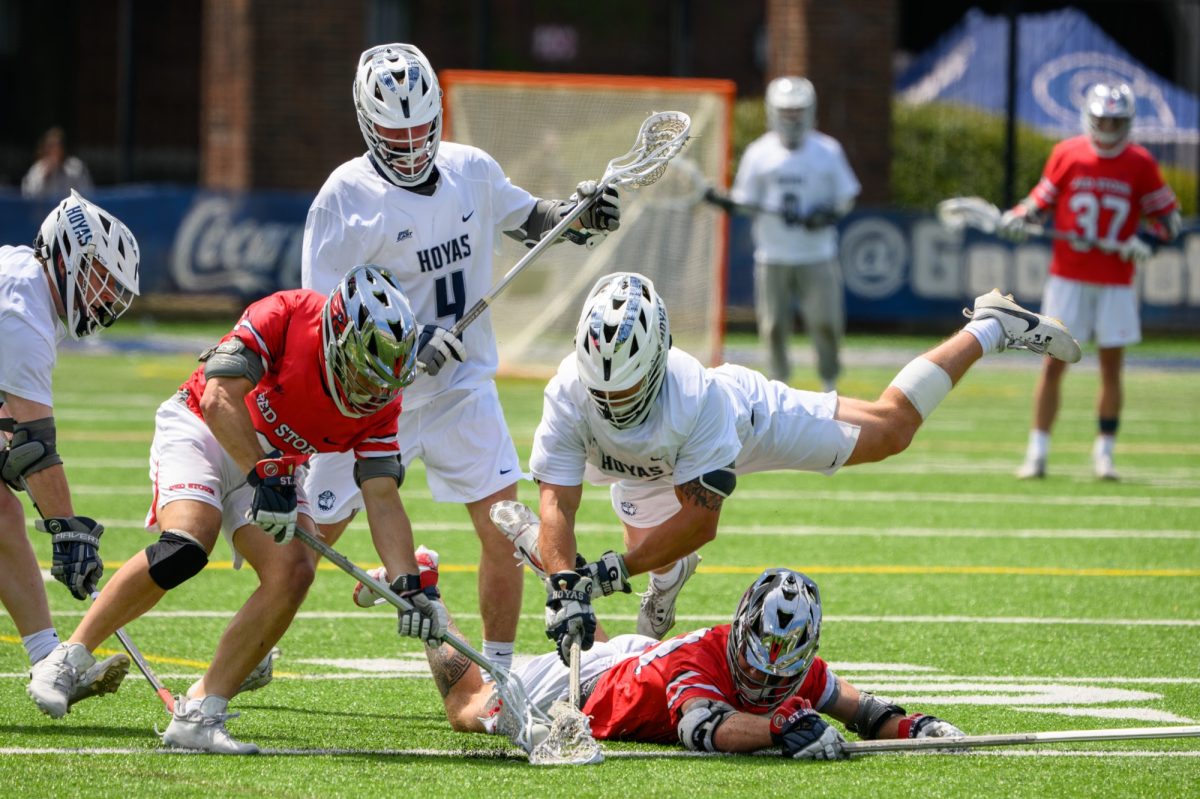When Tom Greaser (MSB ’98) was growing up in Connecticut, he dreamed of becoming a Georgetown University basketball player. He wanted to follow the Georgetown basketball greats of the early 1980s he watched on TV as a kid. However, when it came time for Greaser to attend college, he ended up playing for Georgetown’s soccer team during its rise to glory in the 1990s. In Greaser’s freshman season, the 1994 team secured the soccer program’s first NCAA tournament bid, as well as a Big East championship. In 1997, when Greaser served as a team captain, the team won their first NCAA tournament match.
Though Greaser moved into a career in wealth management after he graduated, he has remained heavily involved in the university’s soccer program. For the last 15 years, Greaser has served as the voice of Hoya soccer on television alongside fellow commentator Dan Helfrich (SFS ’98, GRD ’99). As former Hoya soccer players and college roommates, Greaser and Helfrich have called every home game at Georgetown for years, providing both play-by-play and color commentary. Greaser’s color commentary provides thoughtful analysis of the games and allows viewers around the world to understand soccer more critically. The Hoya spoke with Greaser about his experiences as a Georgetown athlete and commentator and what he expects for future seasons.
What are some of your favorite memories from your time as a Georgetown soccer player? As a student?
There are some things we accomplished as a soccer team the first in program history, whether it’s winning the first Big East championship ever in 1994. And the great memory from that is we’re playing against St. John’s, the football team had a game as well. And at the time we were on Harbin Field down below, not where the soccer field is now. And after the football game was over, the entire team lined the field on the fence around the field and beating St. John’s to secure the Big East regular-season championship, the first in school history, was amazing.
Qualifying for the first-ever NCAA tournament was amazing. Playing a home game in front of 5,000 people, John Thompson Jr. there cheering us on, the Pots and Spoons, which were amazing support to the soccer program. Later on, from a playing perspective, senior year, getting back to the NCAA tournament, and doing something we weren’t able to do as freshmen and win a game. We got to see that from a soccer perspective.
And then, as a student, the lifelong friendships that I’ve been able to enjoy with meeting people from all over the country and all over the world. Those friendships are real today, and they were all formed on the campus.
What was fan participation like when you were a student, and how have you seen it evolve over the years?
Our freshman year, the soccer team really kind of took the university by storm, and it felt like anywhere you went on campus, there was a buzz in the air. That team brought joy to the entire campus, and I mentioned the Pots and Spoons. They were a fantastic group of student support that not only were there at home games, but they also traveled to away games. They were so good at what they did, they actually ended up getting banned by the NCAA with their artificial noisemakers.
That year it was electric around the campus, and so we were a top-10 team in the country, and the university and the community really got behind it. … It was unique where we played because we played now where Cooper Field is, and so in our freshman year where Harbin Hall is, our field basically went the opposite direction of where Cooper is going, so you would have banners hanging outside of Harbin Hall, you’d have students in their windows watching the game in addition to being down at the field. We were kind of right in the center of campus, which was kind of a unique experience, and much different from where the field is today.
Do you think the team benefitted from playing on Harbin Field or gets more advantage from playing on Shaw Field today?
I think both. Clearly, if you’re in the center of campus, as you’re walking by or coming back from a class on a mid-week game, or you wake up on a Saturday morning after sleeping in, you’d see if there’s a game going on. Maybe you’d go and it’s easier to get to the field. And then if you start to see — certainly in our freshman and senior years — more students attending, more and more people gravitated to go there.
But make no mistake about it. The field at Shaw is superior to what we played on. The fact of having a real stadium atmosphere, the work that they put in and around the field is spectacular. And that helps certainly from a recruiting perspective and just seeing a very high-quality field. And Harbin was a good field, but it didn’t have the same feel as Shaw does, with the appearance of it.

What did you learn from your time as a player? How do you think you developed as a player over your four years on the Hilltop?
I learned a lot, but one of the things that I think has been incredibly helpful beyond soccer is how to deal with adversity. Our freshman year, everything went easy. We had a great year and a lot of success. But as is the case in life, sometimes things don’t go as planned and as you hoped for and as you prepared for. And so, when you’re faced with more difficult times, how do you respond to that? And I think that’s served me well over the years.
Sophomore and junior years, we didn’t have the success that we had our freshman year. How do you respond to that? How do you deal with it when you’re on a losing streak? Do you decide to quit and roll over or do you decide to do more work, which has been incredibly helpful as you think about life in general. In terms of development, I mean, I think I certainly benefited my freshman year from having a very strong senior group that showed leadership and kind of led the way.
And I think I did a lot of work behind the scenes to try to get better each and every year, and I certainly think work paid off. People who have any success, it’s not just handed to them. It’s things they do when other people aren’t looking.
When did you start broadcasting, and what inspired you to start commentating?
I’ve always been a huge sports fan and kind of been that armchair announcer, watching games and making comments off the cuff. It wasn’t probably until 15 years ago when Dan [Helfrich] kind of presented the opportunity that Georgetown was going to start broadcasting games that we decided we would give it a try. Having lived together for four years at Georgetown, we would broadcast some games as we’re watching them together, so that was just more of a fun outlet.
Really not having any experience in broadcasting, it was a learning curve, and I think over the years we’ve gotten much better. The equipment we’re using has gotten much better. There were times when in the early years, we had to share a microphone, and I’m not sure our signal went much beyond the field. But now you can get things online, good stream and hopefully some entertainment value from the two of us.
How do you balance the business of your life between juggling work, commentating and your family?
I think that comes back a lot to being a college athlete. It’s time management, it’s having incredible discipline to know what is important to you and understanding that there’s a finite amount of time in each day. So if you know what’s important to you, it’s figuring out how you can formulate your schedule to focus on the things that are important to you and recognizing from a work perspective that isn’t always the most important thing. Family for sure is more important, so making sure that I’m at their school and games.
And then it’s having outlets, whether that’s playing golf or broadcasting, kind of gets you away from the grind of a traditional workday is helpful. And it makes you — while focusing on the work or the broadcasting or the family — it makes you really enjoy that moment more, because you know there are other things you’re going to do with the rest of your day.
The team got their first tournament win during your senior year at GU. What was it like beginning a culture of excellence in Georgetown soccer and seeing it come to fruition today? What was it like experiencing the national championship game firsthand?
The ’94 team was kind of the real first team that had a lot of success with the first Big East championship, first team to qualify for the NCAA tournament. That happens virtually every year now for the program, but at the time, neither of those things had happened. Having experienced that as a freshman, the environment when we were having success, it was something that was incredibly important to make sure that we were able to pass down to players who hadn’t experienced that yet. … And as it relates to the national championship team this year, that was an amazing ride all year long.
The team played incredible soccer from moment one of the season all the way through to the national championship game. They, in my opinion, they were the best team from start to finish, and they much deserved national champion. … And ’94 was a step in that direction, ’97 was a bigger step in that direction and then really 2010 on, there have been huge steps forward, culminating with the season this year.
What has allowed Georgetown soccer to experience this success?
There’s a number of factors. One is the resources that the school and alumni and supporters have put into the program that allows the team to truly recruit and bring in the best players for the system. I think the system and the style of play that Coach Brian Wiese has is hugely important. Georgetown plays an attractive brand of soccer. It’s one where Brian has brought in players who have professional aspirations. Many players have gone on to have great success professionally, and that attracts other good players. And if you know you’re going to train day in and day out with 10 or 15 other players who also hope to make a career playing soccer, you’re able to do it at a great school for a great coach in an amazing city, all of those things add up and sometimes the ball doesn’t bounce your way, but in a year like last year everything went their way, and you’re at the top of college soccer.
What does the team need to do going forward to maintain the standard of excellence and remain a strong competitor for years to come?
I think the big challenge now is dealing with success. The program has had success winning Big East regular seasons and Big East tournament championships, obviously, in 2012, got all the way to the national championship game. But Georgetown had never won a national championship game. They are now the top team, top program, in the country, and so every school certainly in the Big East is trying to knock Georgetown off of its perch. And the players have to enjoy the success and remain humble and disciplined enough to do all the work they were doing leading up to that great success if they’re going to want that to continue.
It’s a different type of challenge when you are the hunted versus the hunter. But I think it’s the quality of the coaching staff and the quality of the players that will understand they have to do all the same things, the little things that got them to this point to continue that success.
What can other Georgetown teams learn from men’s soccer?
I think for all team sports, it’s understanding there’s a process, it’s having a vision, and that starts at the top. Brian has the vision, the style of play. He’s getting the individual pieces to buy into their roles. If you look at the team this year, it got talked about a lot, but the depth of the team was really its greatest attribute, but that requires sacrifice from a lot of players. Guys that at many other programs would be playing 80 or 90 minutes a match are sometimes playing 20 or 30 or 40 minutes a match. So understanding that individual success comes from team success is important, and everyone buying into their role, I think that serves teams everywhere really well.















